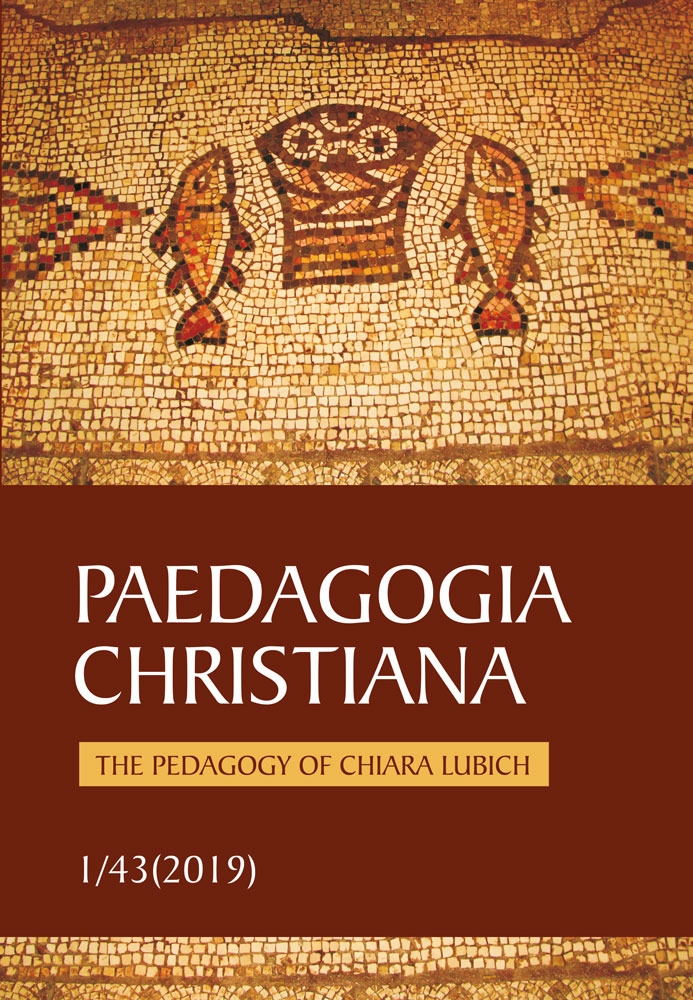An Asian Perspective on Chiara Lubich and her Pedagogy of Fraternity: An Example of the Course “Culture of Unity” in Higher Education in Taiwan
DOI:
https://doi.org/10.12775/PCh.2019.025Keywords
Chiara Lubich, Pedagogy of Fraternity, Culture of Unity, Chiara and AsiaAbstract
As founder of the Focolare Movement, Chiara Lubich was greatly influenced by various fields and disciplines. Her thinking offers a platform of common ground for dialogue. The fundamental elements of Chiara’s dialogue are the concepts of love and fraternity, which not only help the Catholic Church to have dialogue with other cultures and religions, but are also relevant to the academic world and our daily life. Chiara’s thoughts on unity offer a fresh new perspective; once we have adapted our thinking to this, then a new kind of education becomes possible. Her spirituality of unity—introduced to Asia in 1966—has been influential despite the fact that most of the population are non-Christian. Recently, some Asian scholars have been exploring new approaches using Chiara’s philosophy to improve their research methodology and teaching; in Taiwan, the “Culture of Unity” course has experimented with new educational techniques influenced by Chiara’s thinking. This paper aims to examine Chiara’s thoughts on education, as well as her influence on higher education in Taiwan.
References
Bergman, Samuel Hugo. Dialogical Philosophy from Kierkegaard to Buber. New York: State University of New York Press, 1991.
Buber, Martin. Between Man and Man. Eastford: Martino Fine Books, 2014.
Choy, Chee, San Oo Pou. “Reflective thinking and the Teaching Practice: A Precursor for Incorporating Critical Thinking into the Classroom?”. International Journal of Instruction 1 (2012): 167-182.
Flecha, Ramón. Sharing Words: Theory and Practice of Dialogue Learning. MD: Rowman and Little field, 2000.
Gabian, Crescencia C. Dialoge, Light and Fire: Chiara Lubich and the Spirituality of Unity. Manila: University of Santo Thomas Publishing House, 2017.
Gendron, Louis. “The Background and Meaning of Chiara Lubich’s Visit to Taiwan” (Lu Jiale laitai de beijing hen Yiyi盧嘉勒來台的背景和意義). Collectanea Theologica (Shenxue Lunji 神學論集) 111 (2017): 82, 146, 152.
Gross, Edmund. “Dialogue”. In: Encyclopedia Britannica, ed. Hugh Chisholm, vol. 8, 156-157. Cambridge University Press, 1911.
Gross, Mason. Philosophy, Science and Higher Education. Piscataway: Transaction Publishers, 2002.
Huang, Sonja Mei Tin. “The Report on the Conference Patterns of Unity: An Interdisciplinary Dialogue on the Thought of Chiara Lubich (1920-2008)”. Catholic Weekly (Tienzhujaio Zhoubao 天主教週報) 12. 28 April, 2013.
James, Michael, Thomas Masters, Amy Uelmen. Education’s Highest Aim: Teaching and Learning through a Spirituality of Communion. New York: New City Press, 2010.
John Paul II. Crossing the Threshold of Hope. New York: Knopf, 1995.
Leeuw, Karl L. van der. “Philosophical Dialogue and the Search for Truth”. Thinking: the Journal of Philosophy for Children 3 (2004): 1-14.
Lubich, Chiara. Essential Writings: Spirituality Dialogue Culture. London: New City Press, 2007.
Lubich, Chiara. Jesus in our midst. Manila: New City Press, 2003.
Lubich, Chiara. La Dottrina Spirituale. Milano: Mondadori, 2001.
Malebranche, Nicolas. Dialogues on Metaphysics and Religion. Cambridge: Cambridge University Press, 1977.
Maritain, Jacques. Education at the Crossroads. New Haven: Yale University Press, 1966.
Masters, Thomas. “In Pursuit of Education’s Highest Aim: Re-imagining Education through a Spirituality of Communion”. Monthly Review of Philosophy and Culture 10 (2013): 121-137.
Nussbaum, Martha C. Cultivating Humanity: A Classical Defense of Reform in Liberal Education. Cambridge, Massachusetts and London: Harvard University Press, 1997.
Patterns of Unity: An Interdisciplinary Dialogue on the Thought of Chiara Lubich (1920-2008), eds. Sonja Huang Mei Tin, Philipp HU Kungtze. Xinzhuang: Fu Jen Academia Catholica, 2018.
Phillips, Louise. The Promise of Dialogue: The dialogic turn in the production and communication of knowledge. Amsterdam: John Benjamins Publishing Company, 2011.
Singh, Raja Roy. Education for the twenty-first Century: Asia Pacific Perspectives. Bangkok: UNESCO Principal Regional Office, 1991.
Stiglitz, Joseph. “The global crisis, social protection and job”. International Labour Review 1-2 (2009): 1-13.
Xianhai, Li. “From the Rising of Asian Value to the Contemporary Meaning of Confucianism”. Academic Monthly 2 (2006): 53-58.
Xinyi, Ma. “Classic Annotation of Education in Confucian Analects”. Journal of Language and Literary Education 1 (2013): 59-76.
Downloads
Published
How to Cite
Issue
Section
Stats
Number of views and downloads: 555
Number of citations: 0



